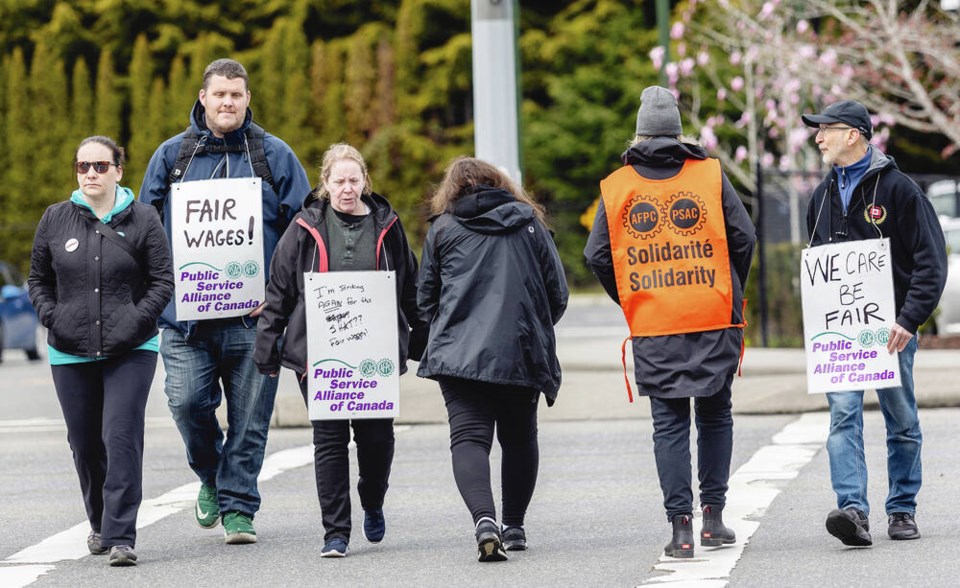On the third day of a nation-wide strike by federal public-sector workers, spirits remained high on capital region picket lines, but some worried about the lack of news from the bargaining table in Ottawa.
“We haven’t gotten any news really about where we’re at,” said Teresa Whitcroft, a strike captain for Local 20975, on Friday. “So everybody’s kind of eagerly anticipating an update.”
Unionized federal workers walked off the job Wednesday, hitting picket lines at some 250 locations across the country, including Vancouver Island.
Grant Russell, who was at the Services Canada location at 3179 Jacklin Rd. on Friday, also said the lack of news from union brass negotiating in Canada’s capital is a bit disconcerting.
“We kind of feel like we’re being kept in the dark,” said Russell. “They don’t want to share the details with us of where they have made headway, and where they haven’t, so people are starting to feel a bit of stress now.”
Unionized federal public servants on Vancouver Island are scheduled to return to picket lines on Monday, with the exception of the Jacklin Road site, which will not be used again.
“We’re all hoping that before Monday we’ll hear it’s been resolved,” said Russell. “That’s kind of the general consensus with the rest of my firefighter buddies anyways.”
Trish Martin, a mobilization co-ordinator for PSAC south Vancouver Island, agreed it’s hard when members on the picket line aren’t getting updates on negotiations.
“They just want to get back to serving Canadians every day like they normally do,” said Martin. “There is a little bit of nervous anticipation, but the mood on the line is invigorated and focused on getting a fair contract.”
The Public Service Alliance of Canada is asking for a 13.5 per cent raise over three years — saying the increases are necessary to keep pace with inflation and the cost of living.
The Treasury Board and the Canada Revenue Agency both say they have offered the union a nine per cent raise over three years, on the recommendation of the third-party Public Interest Commission.
Canada’s largest federal public-service union and the government are both warning of disruptions as nearly a third of all federal workers remain on strike. It could result in a complete halt of the tax season, slowdowns at the border and pauses to new employment insurance, immigration and passport applications.
News of disruptions have raised concerns that taxpayers already facing risings costs will be saddled with paying for wage increases to federal public servants.
Whitcroft, a processor for the Canada Pension Plan, rejects that criticism, saying “public servants are taxpayers, too.”
Whitcroft said striking members are only asking for a sufficient wage to offset the rising cost of living amid high inflation. “I’m asking for an increase so that I don’t have to live paycheque to paycheque.”
Whitcroft said her father worked for the Department of National Defence for his entire life, but what he was able to do on a government salary “and what I am able to do — it’s night and day.”
A Royal Roads business professor cautions that the notion that only public-sector wage hikes — not private-sector ones — represent a cost to taxpayers is misguided, since in the end, consumers pay for most increases, public or private sector.
“I think for many people, the knee-jerk [reaction] is public-sector increases will somehow cost me but others will not,” said Julie MacArthur, an associate professor in the school of business at Royal Roads University in Colwood and a Canada Research Chair in Reimagining Capitalism.
MacArthur said it would not be unusual to see a 13 per cent wage hike — or even more — in the private sector when there have been record profits.
“I think the context is really important for whether we judge whether this is excessive or not,” she said. “It really has to look at the vital roles that these workers are playing.”
According to Statistics Canada, hourly wages for unionized workers in the last three years have risen about nine per cent, and 14 per cent for non-union workers, although that varies from industry to industry, said MacArthur.
The three per cent a year the government is offering “doesn’t sound out of step at all with what other employees are either getting or asking for,” she said, noting recent cost-of-living increases are taking a big bite out of the paycheques of the average federal government worker.
Also, public-sector wages have tended to rise more slowly, she said. “There is a kind of a real wage pressure across the economy in public-sector jobs that have been slow to increase or don’t tend to have large increases,” said MacArthur. Some unions are trying to catch up from losses over the last decade, she said.
>>> To comment on this article, write a letter to the editor: [email protected]



